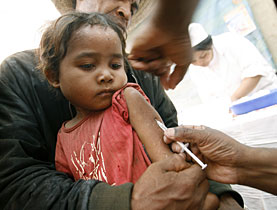Is philanthropy good for health?

New philanthropic organisations funding health programmes in developing countries need better regulation to be effective, a conference has heard.
Speakers in Basel said wealthy foundations were playing a vital role in eradicating neglected diseases, but warned against short term goals and picking “sexy” issues to make a name for egoistic patrons.
The new wave of flexible, dynamic institutions, such as the Bill and Melinda Gates Foundation, are more business-like than old religious models, the meeting heard. Philanthropy is also playing a bigger role in funding the gap between demand for medicines and supply.
But the philanthropic phenomenon brings potential risks, according to Mark Pieth, president of the Basel Institute on Governance that hosted the conference.
“Their [foundation patrons] motivation is frequently to set up a monument to themselves. But the more philanthropy steps in, the more questions it raises about governance and sustainability,” Pieth told swissinfo.
“Will they do it for five years and then stop, leaving all the people who have become used to that healthcare behind? What happens if philanthropists don’t like someone or are only interested in sexy issues that fit their profile?”
Pieth called on the World Health Organization to set up a system of self regulation with benchmarks and performance indicators to cut out duplication of effort and boost the effectiveness of philanthropists.
Wasting money
Much of the foundations’ work is focussed on Africa, the continent that bears the brunt of the three main diseases of poverty: HIV/Aids, malaria and tuberculosis.
Donald G McNeil, science journalist from the New York Times, said that many charities were wasting money because they did not understand the problems of logistics, corruption and the social intricacies of African communities.
Mozambique’s former prime minister, Pascoal Mocumbi, told swissinfo that foundations were providing an important service, but that countries were becoming swamped with the sheer number of charitable offers.
“It creates a problem of managing time and colleagues in government and in institutions. I am a strong advocate for better coordination,” he said.
Mocumbi now heads the European and Developing Countries Clinical Trials Partnership (EDCTP), an initiative that channels the efforts of different parties from research to delivery of vital drugs.
Self-help
But it is essential that philanthropists have long-term goals, understand the needs of communities, create an atmosphere of trust and foster self-sufficiency, he added.
“Trust is achieved when we work in a sustainable [long-term] way with a partner and get to know each other better,” Mocumbi said.
“If I don’t take into account the negative impact of delivering the needs of children, that they could address with their own effort, then I am killing their ability to help themselves.”
swissinfo, Matthew Allen in Basel
The World Health Organization (WHO) defines philanthropic foundations as non-governmental, non-profit organisations with their own fund managed by their own trustees and directors.
WHO calculates that there are some 100,000 such institutions operating in the world today, most of them in the United States. But less than 1% have activities that touch on developing countries.
The number of foundations in the US grew from 30,000 in 1993 to 76,000 in 2006. The value of grants distributed grew from $10 billion to more than $30 billion in the same period.
The Bill and Melinda Gates Foundation, created in 2000 by the Microsoft founder and his wife, is the world’s largest foundation. It has received nearly $39 billion of endowments since its inception and had paid out some $16 billion in grants by the end of 2007.
European foundations pay out an estimated $1.4 billion annually, with most institutions based in Switzerland, Sweden, Denmark, Britain and Germany.
The institute is an independent non-profit think tank, associated with the University of Basel, conducting research and offering policy advice in the realm of public, global and corporate governance.
It focuses mainly on fighting corruption and money laundering as well as advising on regulation mechanisms and compliance systems for governments, corporate and other institutions.
The focus of the two-day conference, entitled: Philanthropy in Global Health, was the need to regulate the efforts of charitable foundations on eradicating diseases and tackling global health problems.

In compliance with the JTI standards
More: SWI swissinfo.ch certified by the Journalism Trust Initiative













You can find an overview of ongoing debates with our journalists here . Please join us!
If you want to start a conversation about a topic raised in this article or want to report factual errors, email us at english@swissinfo.ch.